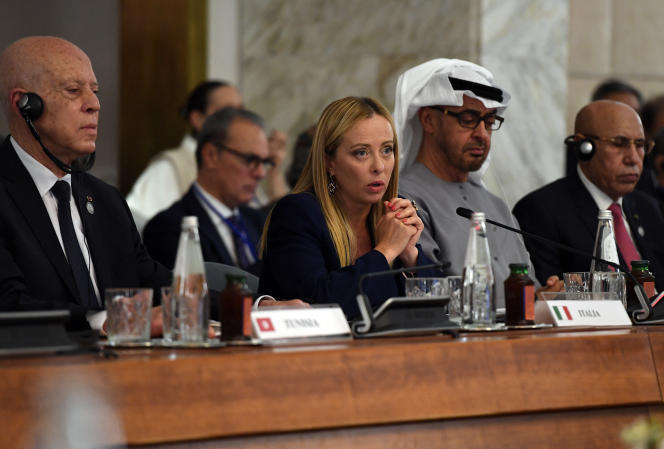The summit of leaders from around the Mediterranean gathered on Sunday July 23 in Rome by Giorgia Meloni outlined the outlines of a fund to finance investment projects and border control, with the medium-term objective of better regulating migratory flows.
At the origin of this conference bringing together the leaders of some twenty countries, Mme Meloni intends to promote a new mode of cooperation between countries of immigration and countries of emigration, on the model of the agreement signed by the European Union (EU) with Tunisia with the aim of curbing the arrival of migrants in Europe. After half a day of talks, the President of the Italian Council announced the creation of a fund which will be supplemented by a first donors’ conference, the date of which has not been fixed, an initiative to which the United Arab Emirates have already contributed 100 million euros.
If no other concrete measures have emerged from the conference, “this is the start of a long process” with the launch of “Rome process”, of which Mme Meloni set the priorities. “Fight against illegal immigration, management of legal immigration flows, support for refugees, and above all, the most important thing, otherwise all that we will do will be insufficient, broad cooperation to support the development of Africa, and particularly of the countries of origin” migrants, she explained. According to the far-right leader, “Priority funding lines must above all concern strategic investments and infrastructure, because this is the most sustainable way of doing cooperation”.
Among the personalities present, the presidents of Tunisia, Kaïs Saïed, of the United Arab Emirates, Mohammed Ben Zayed, of Mauritania, Mohamed Ould Ghazouani, the president of the European Commission, Ursula von der Leyen, the president of the European Council, Charles Michel, the United Nations High Commissioner for Refugees, Filippo Grandi, and delegates from major international financial institutions.
NGOs are standing up
During the 2022 legislative campaign that brought her to power, Giorgia Meloni had promised to “stop the landings” migrants in Italy. His government has since put sticks in the propellers of humanitarian ships, without however drying up departures. According to Rome, some 80,000 people have crossed the Mediterranean and arrived on the coasts of the peninsula since the beginning of the year, against 33,000 last year over the same period, mostly from the Tunisian coast.
Faced with this observation, Mr.me Meloni and the European Commission have intensified their “dialogue” with Tunisia by promising funding if the country undertakes to combat emigration from its territory. Brussels and Rome signed a memorandum of understanding with the Tunisian president last week which notably provides for European aid of 105 million euros intended to prevent the departure of migrant boats and fight against smugglers, as well as more returns of Tunisians in an irregular situation in the EU.
A senior EU official speaking on condition of anonymity confirmed that the EU is keen to negotiate similar partnerships with Egypt and Morocco. And according to Mme Meloni, it is all the more important to support African countries after Moscow suspended the agreement on Ukrainian grain exports “Tunisia is a country in extreme difficulty and abandoning it to its fate can have very serious consequences”she warned.
The NGOs, on the other hand, are standing up. Sea-Watch regrets that “the EU and its member states continue to tighten their deadly policies of isolation”, while Human Rights Watch (HRW) believes that “Europe has learned nothing from its complicity in the atrocious abuses committed against migrants in Libya”. HRW also pointed “serious abuse” in recent months, among the Tunisian security forces against African migrants, believing that the EU should “stop supporting” to this country in the fight against irregular immigration.
Following clashes that claimed the life of a Tunisian on July 3, hundreds of African migrants were driven out of Sfax, the country’s second largest city and Tunisia’s main point of departure for illegal emigration. They were taken by the authorities, according to NGOs, to inhospitable areas near Libya to the east and Algeria to the west.
Newsletter
“The Africa World”
Every Saturday, find a week of news and debates, by the editorial staff of “Monde Afrique”
Register
According to the UN, more than 100,000 migrants arrived in Europe in the first six months of 2023 by sea, from the coasts of North Africa, Turkey and Lebanon. They were just over 189,000 in 2022.
